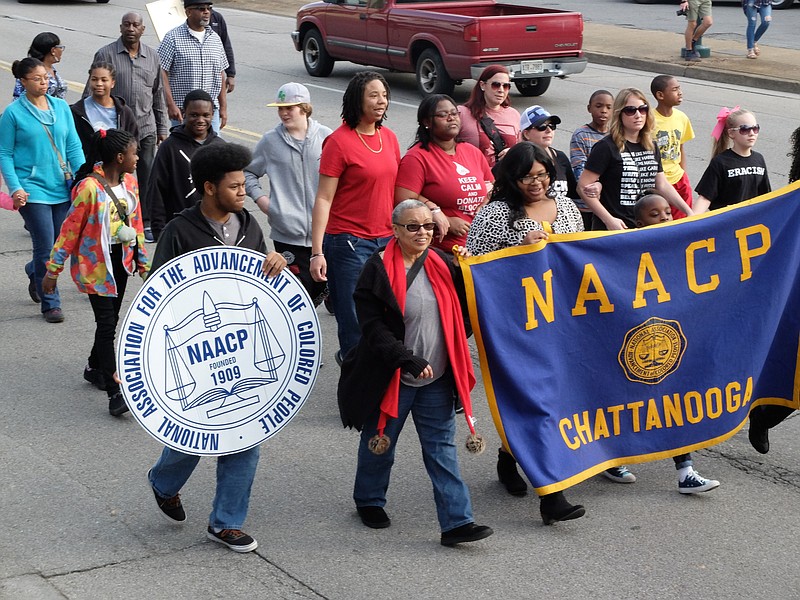Dr. Elenora Woods and the NAACP should be part of City Hall's committee search for the next police chief.
They belong at that table.
To suggest that you can remove discussions of color and race from the selection process is a fantasy; the tip of the spear falls disproportionately on many black neighborhoods. Crime is high. Despair is high. Police interaction is high. But is trust? Is communication?
A police chief sets policies that can build relationships or evaporate them. Community policing and police integrity can be something real, not fluffy talk.
What type of police chief will follow Fred Fletcher, who is retiring this summer? Do we regress back to a heavy-handed, Jeff Sessions type of enforcer? Is this the end of the Violence Reduction Initiative?
What happens if a traffic stop turns into the unthinkable: an unarmed black man shot by white cops?
How will the police chief respond?
How will the community?
Yes, there are good people on the search committee, but just because one of them is a black man doesn't mean the black community is represented. The NAACP is the oldest civil rights group in the nation.
The NAACP needs to be at that table.
And every table.
Why?
"If you aren't at the table, there is little evidence your interests will be considered," said Dr. Ken Chilton, assistant professor in the Department of Public Administration at Tennessee State University.
Last weekend, Chilton, former head of Ochs Center for Metropolitan Studies, presented at a summit for CALEB: Chattanoogans in Action for Love, Equality and Benevolence, a local coalition of churches, labor unions and social justice organizations working against inequality.
Chilton's talk - titled "Old Wine in New Bottles" - claims that the continued fruits of the Chattanooga renaissance have passed over blacks here.
According to Chilton, blacks in Chattanooga were better off in 2000 than today.
"There's been a generation lost," he said.
Chattanooga's Lost Generation is poorer today than in 2000. While white poverty has increased - 11 percent in 2000 to 14 percent in 2015 - black poverty has exploded - 28.5 percent in 2000 compared to 33 percent in 2015.
In other words, one-third of all black Chattanoogans live in poverty.
Chattanooga's Lost Generation has suffered academically; the average ACT score has dropped in the last decade in multiple schools, most of them minority schools.
The Lost Generation has lost economic stability. Between 2000 and 2015, white households lost $1,400 in purchasing power while black households lost $5,200.
Most telling?
The black expulsion from downtown Chattanooga.
In the 15 years between 2000 and 2015, more than 2,600 blacks moved out of neighborhoods around downtown Chattanooga.
And more than 4,800 whites moved in.
This is a slow eviction, as neighborhood after neighborhood that once held poor or working class families of color are now being flipped - to use a real estate term - into high-end, destination zip codes, fueling a sort of land grab. (Chilton mentioned one Nashville businessman who's already purchased nearly three dozen properties in downtown Chattanooga. He's also in Nashville court on accusations of forgery and fraud.)
It is the shadow side of our branded renaissance.
"The Chattanooga brand is highly crafted," said Chilton. "And behind it all is real estate speculation."
Such dichotomy will continue - old wine in new bottles, Chilton says - until black Chattanoogans are given as much access to the tables of power as white Chattanoogans. (Who represents poor black neighborhoods on the River City Company board, for example?)
Put it this way: is it possible for Chattanooga to recreate itself in the way we have while keeping those 2,600 black Chattanoogans - many of them poor - in their downtown homes?
Or does the progress of one lead to the erasure of the other?
For many Chattanooga whites, our finest economic days are before us. Yet, when were the milk and honey days for blacks in Chattanooga? When was their economic highwater mark? The '80s? When Kirkman Technical School was open? These are awful, haunting questions.
The black community deserves a seat at the table, not just scraps from it.
David Cook writes a Sunday column and can be reached at dcook@timesfreepress.com or 423-757-6329. Follow him on Facebook at DavidCookTFP.
